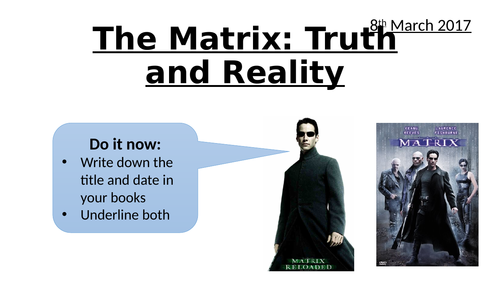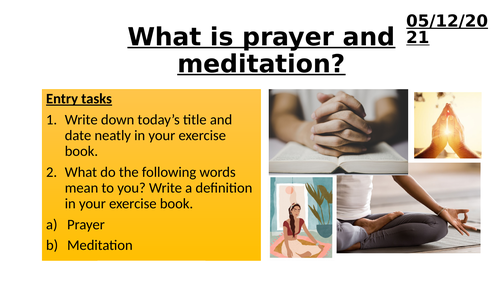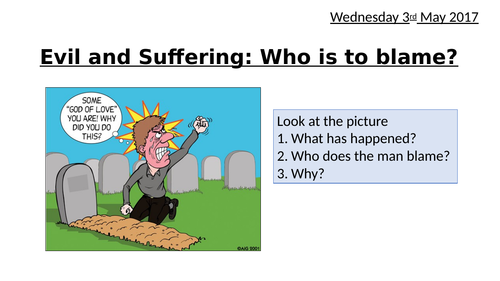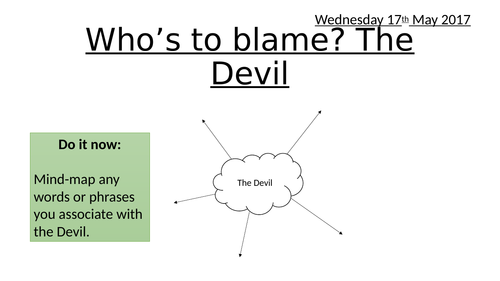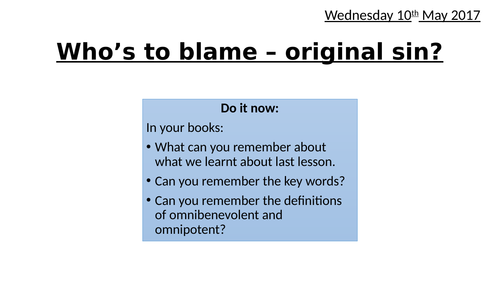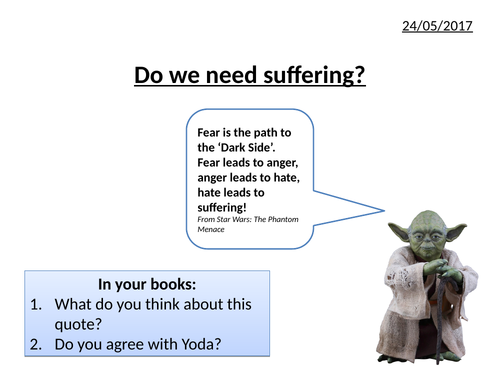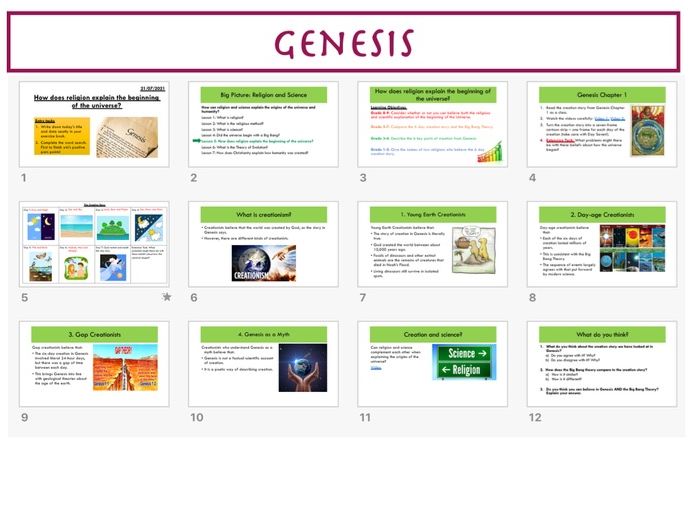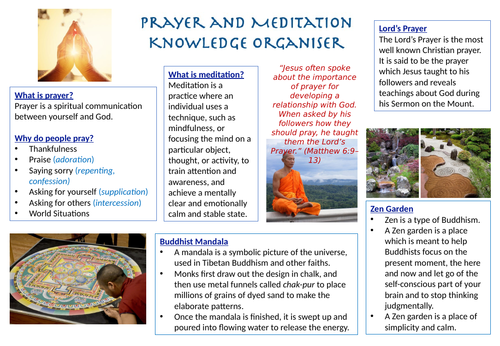338Uploads
118k+Views
41k+Downloads
Religious education

The Matrix: Truth vs Reality
This fun lesson looks at the Matrix: Truth vs Reality and starts with Plato’s Cave. Using video clips, students complete differentiated tasks.
Suitable for 11-14 Philosophy and Ethics/ Religious Studies.
Please review if you purchase.

Buddhist Zen Gardens
Whole lesson for teaching KS2 or KS3 Buddhist Zen Gardens.
How does a zen garden express Buddhist beliefs?
This lesson looks at:
What is Zen Buddhism?
What are the Four Noble Truths?
What is a Zen Garden
What is in a Zen Garden - this looks at all the different parts of a Zen Garden, with pictures and descriptions explaining each part (such as sand, stones, water, bridges, trees and plants etc).
Students will then design their own Zen Garden.
Objectives for the lesson:
Grade 8-9: Explain the importance of Zen gardens to Buddhists.
Grade 5-7: Consider why Buddhists use Zen gardens.
Grade 3-4: Identify and describe a Buddhist Zen garden.
ALL: Design your own Zen garden and explain the different features in your Zen garden.
Feedback is welcome, please review if you purchase!

Introduction to Prayer and Meditation
Suitable for teaching KS2 or KS3.
What is prayer and meditation?
This lesson looks at:
What is prayer?
Why do people pray?
What is meditation?
Looking at aids to prayer and meditation in different religions.
Lesson objectives:
Grade 8-9: Analyse why different people pray and meditate and correctly identify aids to prayer for different religions.
Grade 5-7: Consider why people pray and meditate, and describe the aids used by different religions.
Grade 3-4: Identify aids to prayer and know what religion they are used in.
Feedback is welcome, please review if you purchase!

What is the Religious Method?
KS3 Philosophy and Ethics - Lesson 2 of the Science and Religion SoW.
This lesson looks at ‘What is the Religious Method’?
Students will be able to:
Explain why you think religion is important.
Use the ‘religious method’ to decide what societies have a religion.
Describe what the ‘religious method’ is used for.
Give two expectations you have of religious people.
All resources are included.
Feedback is welcome, please check out the rest of my lessons in the Science and Religion Scheme of Work!

How can religion answer Big Questions?
KS3 Philosophy and Ethics - Lesson 5 of the ‘What Big Questions are there?’ Scheme of Work.
This lesson looks at 'Can religion answer the Big Questions?
This lesson looks at why does God allow suffering and how religion may be able to answer some of life’s big questions.
By the end of the lesson, students will be able to:
Judge which reason you believe has the strongest argument and explain your personal view about why bad things happen.
Explain with examples different reasons God allows bad things to happen.
Consider reasons why God allows bad things to happen.
Feedback is welcome, please check out the rest of my lessons in the ‘What Big Questions are there?’

Who is to blame for evil and suffering?
Full lesson plus activities and for teaching who is to blame for evil and suffering. Suitable for 11-16 Philosophy and Ethics or Religious Studies.

Who is to blame? - The Devil
Whole lesson looking at who is to blame for evil and suffering - the Devil.
Whole lesson plus resources and activities.
Can be used for 11-14 Philosophy or Religious Education.

Pandora's Box
Whole lesson plus differentiated activities and links to videos. For teaching 11-16 Philosophy or Religious Education.
Bundle

Evil and Suffering Scheme of Work
SAVE 25%!!!
Whole Scheme of Work for teaching the unit Evil and Suffering for Religious Studies/Philosophy and Ethics.
All 5 lessons include differentiated resources, activities, and everything you need to teach it straight away.
Starts off with looking into the idea of evil and suffering with Pandora’s box, the following lessons explore the idea of who is to blame - the Devil, us, and do we need suffering?
Pandora’s Box
Who is to blame
Original Sin
The Devil
Do we need suffering?
Please review if you purchase.

Evil and suffering - original sin
Who is to blame for evil and suffering? This lesson explores original sin. Whole lesson plus resources and differentiated activities included.

Do we need suffering?
Whole lesson, plus differentiated activities and resources for a lesson on do we need suffering?
Suitable for 11-14 Religious Education or Philosophy.

Introduction to World Religions
Suitable for KS3 - An Introduction to World Religions
This lesson looks at;
What is Philosophy and Ethics
What are the main religions (match the symbol to the religion)
How old are the main religions?
What percentage of the world follow each religion?
Perfect as an introductory lesson. Includes a pie chart and graph for some maths curricula links!
Feedback is welcome, please check out my other Philosophy lessons and resources.

What is Religion?
Suitbale for 11-14/ KS3 Philosophy and Ethics - Lesson 1 of the Science and Religion SoW.
This lesson looks at ‘What is Religion’?
Students will be able to:
Explain what a religion is using specific examples.
Describe your expectations of what a religious person should be.
Understand what religion is.
Name at least 3 religions.
All resources included!
Feedback is welcome, please check out the rest of my lessons in the Science and Religion Scheme of Work!

What is Science?
KS3 Philosophy and Ethics - Lesson 3 of the Science and Religion SoW.
This lesson looks at ‘What is Science’?
Students will be able to:
Explain what the scientific method is and use it to look at real life experiments.
Discuss at least two things that science now explains that used to be explained by religion.
State at least three areas that are involved in science.
All resources included!
Feedback is welcome, please check out the rest of my lessons in the Science and Religion Scheme of Work!

Did the universe begin with the Big Bang?
KS3 Philosophy and Ethics - Lesson 4 of the Science and Religion SoW.
This lesson looks at ‘Did the universe begin with the Big Bang’?
In this lesson students will consider the scientific explanation for the origins of the universe.
Students will be able to:
Describe what the Big Bang is and why scientists think the Big Bang is important.
Explain three pieces of evidence for the Big Bang happening.
State three problems with the Big Bang theory.
All resources included!
Feedback is welcome, please check out the rest of my lessons in the Science and Religion Scheme of Work!

Genesis
KS3 Philosophy and Ethics - Lesson 5 of the Science and Religion SoW.
This lesson looks at ‘How does religion explain the beginning of the universe’? - Genesis
Students will be able to:
Consider whether or not you can believe both the religious and scientific explanation of the beginning of the Universe.
Compare the 6 day creation story and the Big Bang Theory.
Describe the 6 key parts of creation from Genesis.
Give the names of two religions who believe the 6 day creation story
All resources are included!
Genesis word search
Worksheets
Extract from the Bible
Feedback is welcome, please check out the rest of my lessons in the Science and Religion Scheme of Work!

Adam and Eve
KS3 Philosophy and Ethics - Lesson 7 of the Science and Religion SoW.
This lesson looks at 'How does Christianity explain how humanity was created?'
Students will be able to:
Evaluate strengths and weaknesses of the Adam and Eve story including evidence.
Demonstrate the problems that some people may have with this version of events.
Explain what the story teaches about the relationship between humans and God.
Describe the creation of humanity found in the Bible.
All resources are included!
Feedback is welcome, please check out the rest of my lessons in the Science and Religion Scheme of Work!

Prayer and Meditation Knowledge Organiser
Knowledge Organiser for teaching Prayer and Meditation at KS3.
This colourful knowledge organiser covers:
What is prayer?
What is meditation?
The Lord’s Prayer
Buddhist Mandala’s
Zen Gardens
All on one A4 page! Perfect for revision.
Please review if you purchase, feedback is welcome.

Theory of Evolution
KS3 Philosophy and Ethics - Lesson 6 of the Science and Religion SoW.
This lesson looks at ‘What is the Theory of Evolution’?
Students will be able to:
Evaluate arguments for and against and give your own opinion, with a reason, on the Theory of Evolution.
Explain the evidence given by science to prove the existence of evolution.
Describe what this theory tells us about life on Earth.
State who came up with the Theory of Evolution and how he knew this.
All resources are included!
Feedback is welcome, please check out the rest of my lessons in the Science and Religion Scheme of Work!
Bundle

Religion and Science SOW BUNDLE!
Religion and Science Scheme of Work BUNDLE!
Suitable for KS3 Religious Studies / Philosophy and Ethics
This bundle includes 7 lessons - all fully resourced!
This Scheme of Work explores both Religion and Science - looking at religious and scientific explanations for the origins of the universe and humanity with an overarching question of whether BOTH can be used side by side to explain our origins.
Lessons included:
What is religion?
What is the religious method?
What is science?
Did the universe begin with a Big Bang?
Story of Genesis
Theory of Evolution
Adam and Eve
Please review if you purchase.

